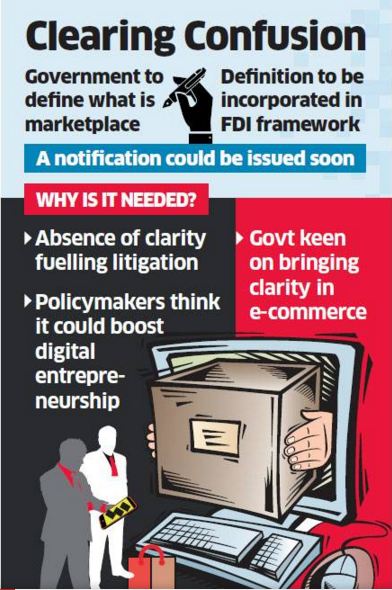New DELHI: The government will soon issue a clear definition of what constitutes a ‘marketplace’ in the context of ecommerce in the country’s foreign direct investment (FDI) policy, hoping to end disputes over popular online retail websites and encourage entrepreneurship in the digital space by leaving it unfettered
Central to this is the future of the model that’s used by companies such as Flipkart, Amazon India and Snapdeal, all of which call themselves marketplaces that allow buyers and sellers to transact without themselves selling anything. Brick-and-mortar retailers have long complained that this is a ruse to get around the bar on overseas investment in companies selling directly to consumers.
The indications are that existing arrangements are unlikely to be affected. The finance ministry and the department of industrial policy and promotion (DIPP) have held discussions on the issue and an announcement is imminent, a government official aware of the development told ET.
“Discussions have been completed on the matter,” said the official, adding that a notification would suffice and a cabinet decision won’t be needed. Changes in FDI policy are usually made through notifications known as press notes. The definition is likely to emphasize on revenues. Ecommerce companies calling themselves marketplaces will need to derive revenues largely from fees for services provided and should not be trading on their own account.
 The official said this will bring clarity to the foreign investment framework and encourage entrepreneurship in the digital space by providing market access. India allows 100% overseas investment in business-to-business (B2B) ecommerce companies but bars it in the business-to-consumer (B2C) segment.
The official said this will bring clarity to the foreign investment framework and encourage entrepreneurship in the digital space by providing market access. India allows 100% overseas investment in business-to-business (B2B) ecommerce companies but bars it in the business-to-consumer (B2C) segment.
This has led to accusations by offline retailers that billions of dollars of foreign investment in ecommerce sites such as Flipkart, Amazon India and Snapdeal are in violation of this policy.
The ecommerce companies say they only run marketplaces on which others sell goods to consumers and are in compliance with the law.
The government has held detailed consultations with stakeholders on the term, which is currently not defined in the foreign investment policy.
A DIPP discussion paper issued on January 7, 2014, said: “Marketplace provides a platform for business transactions between buyers and sellers to take place and in return for the services provided, earns commission from sellers of goods/services.”
The absence of clarity has fueled litigation, with the All India Footwear Manufacturers and Retailers Association taking the ecommerce companies to court. The finance ministry and DIPP held discussions on the issue before the budget, which unveiled a number of big-ticket changes including FDI in food retail and further liberalization in insurance, pension, asset reconstruction companies and stock exchanges.
Overseas investment in food retail has been allowed to help boost the agricultural economy. Manufacturers and single brand retailers having foreign investment have also been allowed to sell online. Key policymakers in government are convinced that the digital space will spawn number of entrepreneurs and provide employment opportunities to young people entering the job market and don’t want anything to constrain that opportunity. “Unnecessary confusion drives away businesses,” said the official cited above.
The rapidly growing ecommerce segment is expected to surge to $228 billion by 2030, Goldman Sachs estimates, as more Indians take to shopping online. Sales in 2015 were pegged at $22 billion, according to a PwC report.
Article Source : www.timesofindia.indiatimes.com
Leave a Reply










